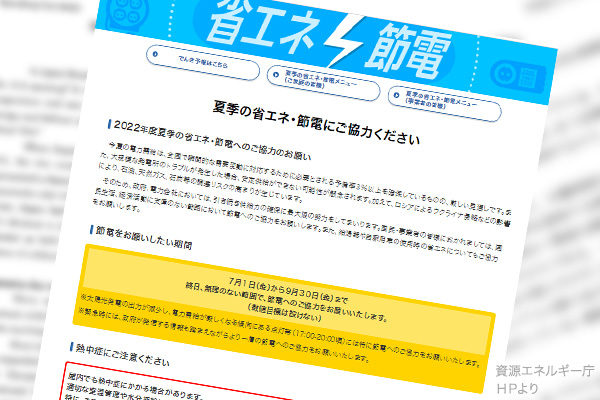On scorching hot days in late June with temperatures over 35 degrees Celsius, the Japanese government issued a tight power supply advisory for the service area of Tokyo Electric Power Co., Inc., following a tougher warning given amid a cold wave in March. The fundamental cause of the electricity shortage is simple: many nuclear power plants in northern half of the country including the Hamaoka power station in Shizuoka Prefecture have not been restarted. Japan has given priority to solar and other unstable renewable energies while reducing dependence on nuclear power plants as much as possible and has promoted electricity market deregulation. Such energy policy has backfired.
Thermal power generation retains a major presence
Why does an electricity supply-demand balance tighten at a time when solar power generation increases on blazing hot days? Because solar power generation declines rapidly in the late afternoon when cooling demand expands in the humid heat after the generation remains robust from 9 a.m. to 3 p.m.
As an increase in renewable energy power generation capacity has led thermal power plants to reduce their capacity utilization rates and become less profitable, power companies had to engage in management rationalization under electricity market deregulation by decommissioning their outdated thermal power plants. So far, thermal power plants with a total capacity of 16 million kilowatts have been decommissioned. But thermal power plants are required to make up for unstable power output from solar and wind power generation known as variable power sources. Thermal power plants still account for 74% of Japan’s total power generation. Therefore, CO2 emissions from the power generation have hardly declined.
Germany had been seen as leader in renewable energy power generation. But former Chancellor Angela Merkel who has built a direct natural gas pipeline from Russia to Germany only increased gas-burning power plants while reducing coal-burning plants. Germany has raised renewables’ share of the power mix to 46%, but failed to substantially reduce CO2 emissions.
As natural gas and oil price have spiked due to Russia’s war of aggression against Ukraine, electricity bills have risen in Germany and Japan where thermal power plants’ shares are high. Higher electricity costs have led to price hikes for food produced at factories, dealing a severe blow to socially weak people.
Policy change to prioritize nuclear power is required
Japan has become a country where the electricity supply-demand balance tightens rather frequently. The balance is expected to be tight next winter as well as this summer. Prime Minister Fumio Kishida should immediately revise Japan’s energy policy to take advantage of safer nuclear power plants for low-cost, stable power generation to put Japan’s economy and industry on a growth path.
Government-planned decarbonization investment worth 150 trillion yen should not be allocated mainly to variable renewable energy power generation that contributes little to cutting CO2 emissions. Instead, the government should utilize nuclear power plants as stable power sources. Japan should accelerate the development and construction of safer small modular reactors (SMRs) and other advanced reactors. With 50 trillion yen, Japan can build 100 500-billion-yen nuclear reactors. The remaining 100 trillion yen could be invested in facilities to produce hydrogen for hydrogen power generation and synthetic fuels using CO2.
If 150 trillion yen is spent in this way, Japan can achieve carbon neutrality by 2050. In France that features less CO2 emissions and takes leadership in a comeback to nuclear energy, President Emanuel Macron has vowed to construct up to 14 large European pressured water reactors (EPRs). The United Kingdom will follow suit. Furthermore, many countries in Europe and Southeast Asia are moving to introduce nuclear power plants.
Tadashi Narabayashi is a professor emeritus at the Hokkaido University and a director of the Japan Institute for National Fundamentals.


